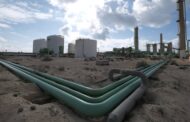For decades, Norway has been Britain’s leading source of imported energy.
However, that relationship may be set to come under strain after the Scandinavian nation warned that its vast oil and gas fields are in decline.
The threat of dwindling production would herald a potential energy crisis for the UK, which last year relied on Norway for half its gas and a quarter of its oil.
Worse still, a drop in Norwegian output would strengthen Russia’s grip on the global gas market, posing a geopolitical nightmare for governments across Europe.
Advertisement
Advertisement
According to a new report from the Norwegian Offshore Directorate (NOD), the country’s oil and gas supplies peaked last year and are expected to dwindle from now on.
Its findings revealed Norway produced about 230m standard cubic metres of oil and gas in 2024, although that could fall to as low as 110m cubic metres by 2035.
Experts claim extra investment could help slow the decline, although there is no escaping from the fact that Norway’s best oil and gas fields are becoming increasingly depleted.
“We expect overall production to decline in the later 2020s,” the report from the Norwegian Offshore Directorate said.
Advertisement
Advertisement
“In order to slow this decline, exploration will need to take place close to infrastructure and in more frontier areas, in addition to making more investments in fields, discoveries and infrastructure.
“Failure to invest will lead to rapid dismantling of petroleum activities.”
While an obvious concern for Norwegian households, the latest warning from the NOD will also send a chill through Ed Miliband’s Energy Department.
Last year, Norway became Britain’s primary source of gas after supplying 29bn cubic metres, whereas the UK’s North Sea output shrank to 26bn cubic metres.
Over the next decade, UK production is expected to decline by a further 70pc, meaning reliance on costly imported gas will increase in the coming years.
Advertisement
Advertisement
Norway has long been expected to be the primary source of that gas.
However, the UK and the rest of Europe now face the prospect of being forced into the arms of countries like Russia if Norway starts to turn off the taps.
“Dusk for Norway is dawn for Russia,” says Andreas Schroeder, head of energy analytics at the Independent Commodity Intelligence Service (ICIS).
“Russia is unlikely to dominate Europe again as in the past when it had nearly 40pc market share.
“But the call to open the pipes and gates for cheap Russian gas will get louder over time as gas prices increase with dwindling Norwegian output.
Advertisement
Advertisement
“It creates a case for more cooperation with Russia and will encourage Russia-friendly politicians in countries like Slovakia and Hungary.”
Since production started in 1971, oil and gas have been produced from a total of 123 fields on the Norwegian shelf.
At the end of 2023, 92 fields were in production, including 67 in the North Sea, 23 in the Norwegian Sea and two in the Barents Sea.
In total, Norway’s fields contain 251m barrels of recoverable oil, which is roughly 10 times what is known to remain in UK waters.
That will have declined by 2050, though experts predict there could still be more than 100m barrels worth of oil remaining.
Advertisement
Advertisement
However, that is only if Norway chooses to increase investment sharply, analysts say. A failure to do so will mean recoverable levels will fall close to zero.
That choice now rests not only with oil companies but also with voters and politicians.
The Green Party of Norway, which has pledged to “shut down the use of fossil fuels as quickly as possible”, won just three of Norway’s 169 parliamentary seats in the 2021 election.
But the Greens’ apparent failure was not because the electorate rejected their ideas.
Instead, the winning coalition parties, comprising the social-democratic Labour Party (48 seats) and the agrarian Centre Party (28 seats), both latched on to the anti-fossil fuels bandwagon and committed to a “managed transition” away from fossil fuels.
Advertisement
Advertisement
They are supported, albeit unofficially, by the Socialist Left Party (13 seats) – which wants an immediate halt to all oil exploration.
It means Norway is now ruled by political parties committed to halting oil and gas production, albeit disagreeing over how long it will take to achieve it.
The next elections are due in September this year – and British politicians will be watching closely.
Professor Gunnar Eskeland, of the Norwegian School of Economics, thinks a total ban on drilling is unlikely.
“I doubt it would happen. Money wins!” he says, referring to Norway’s renowned sovereign wealth fund, which takes a percentage of all the taxes paid on Norway’s oil and gas wealth.
Advertisement
Advertisement
“As of November 2024, it had over $1.74 trillion (£1.4 trillion) in assets, and held on average 1.5pc of all of the world’s listed companies.
“That makes it the world’s largest single sovereign wealth fund in terms of total assets under management. It translates to over $325,000 [savings] per Norwegian citizen.”
Much of that money has come directly from British consumers.
Over the 12 months leading up to October, the UK imported £10.2bn worth of oil and £10.5bn worth of gas from Norway.
This equates to £740 for every UK household, although even that is only a fraction of what we paid in 2022.
Back then, when Russia’s invasion of Ukraine sent prices to an all-time high, the UK spent more than £40bn on Norwegian oil and gas.
Advertisement
Advertisement
Much of that money went straight into the Norwegian savings bank – its sovereign wealth fund – where it will continue supporting Norwegians long after their oil and gas has run out or been shut down.
Why did Britain, which also once enjoyed huge oil and gas wealth from the North Sea, not do the same as the Norwegians?
Or, as one infamous piece of graffiti scrawled on a wall in Aberdeen once put it: “Dear God, give us another oil boom. Next time we won’t p— it up against the wall.”
Michael Bradshaw, professor of Global Energy at Warwick Business School, says Britain had farmed out most of its oil and gas exploration to foreign companies, leading to profits being funnelled offshore.
Advertisement
Advertisement
“Unlike the UK, Norway benefits from having a high level of state ownership of its oil and gas industry and now has a very substantial sovereign wealth fund,” he says. “We just spent the money. So now we are paying the Norwegian state handsomely for their gas and they are providing security of supply to the UK in return.”
The Vikings would have been proud.










